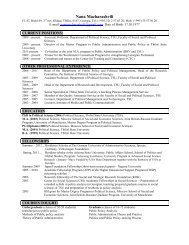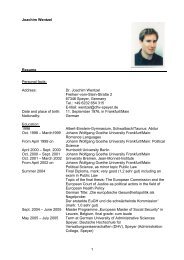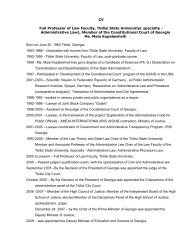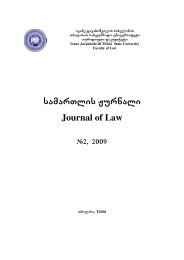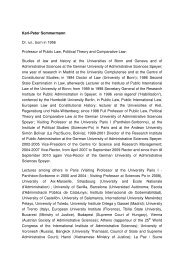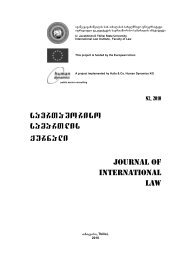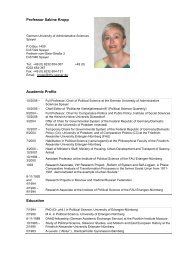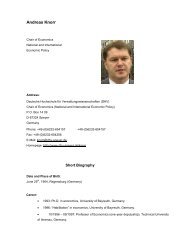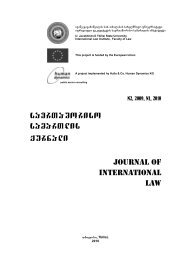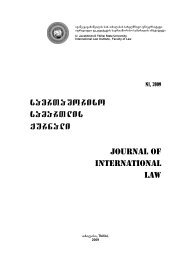Untitled
Untitled
Untitled
You also want an ePaper? Increase the reach of your titles
YUMPU automatically turns print PDFs into web optimized ePapers that Google loves.
saerTaSoriso samarTlis Jurnali, #1, 2008 JOURNAL OF INTERNATIONAL LAW, N1, 2008<br />
THE BEGINNING AND THE END OF THE<br />
TIME TO BE TAKEN INTO CONSIDERATION<br />
According to the Article 28 of the Vienna<br />
Convention on the Law of Treaties, “unless a<br />
different intention appears from the treaty or<br />
is otherwise established, its provisions do not<br />
bound a party in relation to any act or fact<br />
which took place or any situation which ceased<br />
to exist before the date of the entry into force<br />
of the treaty with respect to that party”. 9<br />
The foregone principle also extends to the<br />
European Convention for the Protection of<br />
Human Rights and Fundamental Freedoms.<br />
The Strasbourg Court has mentioned in a number<br />
of cases dealing with the length of the proceedings<br />
that the Convention does not have<br />
a retroactive effect.<br />
In the case Silva Pontes v. Portugal the<br />
Court concluded, that the period to be taken<br />
into consideration for the purpose of the Article<br />
6(1) did not begin to run when the applicant<br />
first brought the civil action before the<br />
relevant court requesting compensation for the<br />
damage of the health on 20 December 1977,<br />
but only on 9 November 1978, when the Convention<br />
entered into force with regard to Portugal.<br />
10<br />
At the same time, “the judgment of the<br />
Court, on whether or not the proceedings have<br />
taken place with the respective speed, after<br />
the Convention entered into force, will be influenced<br />
by the very fact that the case is being<br />
considered for a long time already”. 11 This<br />
connotates that to a certain degree the time<br />
lapsed before the ratification of the Convention<br />
is also taken into consideration.<br />
After the establishing the date of the entry<br />
into force of the Convention with regard to<br />
a particular State, the Court considers the<br />
beginning and the end of the time to be taken<br />
into consideration.<br />
“in criminal matters, the “reasonable time”<br />
referred to in Article 6(1) begins to run as soon<br />
as a person is charged”. 12<br />
“... Charge”, for the purposes of Article<br />
6(1), may in general be defined as "the official<br />
notification given to an individual by the<br />
competent authority of an allegation that he<br />
has committed a criminal offence”. 13<br />
“A person may be charged at the time of<br />
arrest or when preliminary proceedings are<br />
opened”. 14<br />
In the case Wemhoff v. FRG the Court<br />
found, that the beginning of the period to be<br />
taken into consideration must run from 9 November<br />
1961, the date on which the first<br />
charges were levelled against Wemhoff and<br />
his arrest was ordered. It was on that date that<br />
his right to a hearing within a reasonable time<br />
came into being so that the criminal charges<br />
could be determined. The indictment was however<br />
filed only over two years after the pretrial<br />
investigation was completed. 15<br />
Deriving from this, in a criminal case the<br />
starting date for determining the time to be<br />
taken into consideration shall be the date,<br />
when a person for the first time was officially<br />
notified via official sources about the commencement<br />
by the duly authorized state bodies<br />
of certain procedures in his respect. As a<br />
rule, this is the time when a person is charged.<br />
There are also instances when the commencement<br />
of the criminal prosecution, recognition<br />
of a person as suspect, detention or other<br />
procedural action precedes charging. In such<br />
a case any date, which preceded the others,<br />
and when the applicant learned for the first<br />
time that a doubt had emerged in his respect<br />
shall be considered as the commencement of<br />
the term.<br />
In civil cases this issue is solved in the following<br />
manner: if the applicant was a plaintiff,<br />
the calculation of the term shall start from filing<br />
a suit. In cases where the applicant was a<br />
respondent, the time of handing over the court<br />
notification on appearance in court shall be<br />
considered as a starting point for this term.<br />
In the case Guincho v. Portugal the Court<br />
found that the starting point of the relevant<br />
period, reasonableness of which should have<br />
been assessed, was the date proceedings<br />
were instituted before the Court requesting<br />
compensation for health damages. 16<br />
In the case Vernillo v. France the Court<br />
found that the period to be considered began<br />
when the applicants were summoned before<br />
the tribunal. 17<br />
The case Beaumartin v. France is especially<br />
interesting, as the application was filed<br />
in the Paris Administrative Court. It appeared<br />
that the dispute fell outside that court’s jurisdiction<br />
and forwarded the application and the<br />
file to the Conseil d’Etat. The European Court<br />
regarded that the calculation of a reasonable<br />
time should have been commenced from the<br />
moment when the applicant first filed the case,<br />
116



